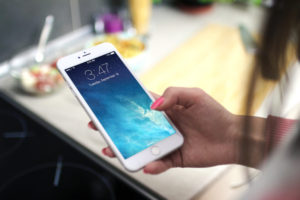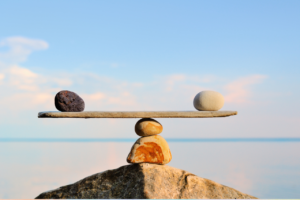Unplugging: Five Steps To Making Your Digital Detox A Success
Our lives look vastly different than they did just 30 short years ago. Devices are ubiquitous, an unimaginable reality in the pre-internet days. Whether you prefer PC, tablet, phone, or now even watch, you can get your daily dose of technology in whatever form you’d like.
 Smartphones in particular seem to be becoming an integral part of our lives. 62% of smartphone users look at their device within 15 minutes of waking and use almost 50 times throughout the day. For the younger generation, that number reaches almost 80 times a day.¹ With such frequent use, smartphone addiction is now a legitimate concern for some.²
Smartphones in particular seem to be becoming an integral part of our lives. 62% of smartphone users look at their device within 15 minutes of waking and use almost 50 times throughout the day. For the younger generation, that number reaches almost 80 times a day.¹ With such frequent use, smartphone addiction is now a legitimate concern for some.²
Technology has some great benefits. How tedious is the thought of using an encyclopedia now that we have Google. But our coveted technology comes with a price.
We are just beginning to realize the negative implications of social media, smartphones, and our ability to be accessible 24/7 but the research so far is concerning. For example, the more someone uses social media sites like Facebook, the lower their self-esteem.³ Use of devices and exposure to blue light at night is linked with increased risk obesity, insomnia, lowered body temperature, high cholesterol, hypertension, and breast and prostate cancer.⁴ Blue light blocks production of melatonin, a hormone that is a strong antioxidant and rises at night to make you fall asleep. And cyberbullying is something even our current President is not immune to.
Beyond the negative health impacts, constantly being interrupted by texts, emails, or social media notifications greatly reduces productivity. In a time when everyone is “busy” with never-ending to-do lists, wouldn’t we want to maximize the amount of time we have to get things done? Not to mention, boredom actually has positive benefits, such as being a “stimulus for change, leading you to better ideas, higher ambitions, and greater opportunities.”⁵
Before you think I’m completely against all forms of technology, I’m not. As silly as it sounds, I love some of my apps, using the cloud, and being able to download books to read right on my phone. I don’t think technology created a lot of these issues (minus the negative health effects of blue light). Rather, they allowed these societal issues to be magnified. If low self-esteem and bullying was a small cut, social media has turned those issues into a festering sore, something that can’t be ignored.
Even though we may have forgotten, life was full and rich pre-internet and smartphones. Life is about doing what you can to live your core values. If technology supports that endeavor, then wonderful. If, however, it distracts you from embodying those values and further distances you from yourself and others, then it’s time to take a break. Do you want to be known as the person with the most FB likes or followers? Someone who was the fastest to respond by email? Or a person that was compassionate, kind, and made a difference?
Undergoing a digital detox, particularly from your smartphone, is the easiest way to reconnect with the values, people, and things that are important. Here are five steps to use when undertaking a digital detox to ensure its success.
1. Start Small
Don’t pull the plug for an entire week. Especially if just the idea of that causes you to start panicking. The point is not to stress you out but to break these digital habits. Start with a small chunk of time. Try a four-hour block on the weekend or whenever is the least busy time for you. If four hours seems too much, try two or even one hour. If you haven’t exercised for a year, you wouldn’t start with 50 pushups. You would start with one pushup and increase over time. Start with a chunk of time that seems doable and then slowly increase the amount of time.
2. Actually turn things OFF
No silent or airplane mode. Actually turn your devices off. It takes less than a second to un-silence your phone but it is a longer process to have to boot up your electronics, which gives you a few extra moments to think through your decision and stop yourself. If you could eat any kind of junk food but you had to cook it yourself, odds are you would not consume as much just because it took more time to prepare. Creating those extra 10 seconds of buffer may be all the time you need to stop yourself from sabotaging your digital detox.
3. Focus on the positive

My first knitted afghan! So cozy for winter.
Instead of focusing on not having access to your favorite apps or devices, focus on what you will have time for. Spend uninterrupted quality time with friends and family. Read a book. Go for a walk. Cook/prep your meals for the week. Declutter a part of your house. Take a nap. Have a solo dance party. Start a new hobby or reconnect with long-forgotten ones. I began knitting again about five months ago and have already completed a few projects. The joy from doing something creative and the sense of accomplishment is significantly more than I could have gotten from clearing out my inbox. And I now have tangible items to use in my daily life that add value. The possibilities are limitless when you free up some time and can focus on things that are important to you.
4. Be consistent
Since your technology use has probably become habitual, make your detox from it a habit as well. You can detox daily (no devices before 8am or after 8pm), weekly, (no devices for half of Sunday), or monthly. I’ve even heard of some people taking 3 full days off every 3 months as a reset. Whatever works for you but it needs to happen on a regular basis to retrain your brain and get the full benefit. Again, think of this like healthy eating or exercise. It’s not a one-and-done kind of thing. At the very minimum, I would suggest a quarterly detox but the more frequent the better.
5. Leverage technology to help
As counterintuitive as that may sound, you can use technology to help break these habits and make detoxing easier. Most smartphones have a “do not disturb” function that can be scheduled so your phone does the work for you. (Great if you’re doing a daily detox.) Turn off your notifications or even delete some apps. I completely deleted my email app from my phone and turned off notifications for all social media. I get to decide to check them when I want and not feel compelled to because my phone is beeping at me.
Go old school and get an alarm clock for your bedroom. Most of us now use our phones as an alarm but that makes your smartphone (and all the notifications, emails, texts that come with it) within arms reach. Even laptops have apps that can block distracting websites during times you set to help you break the habit. And smartphones and computers now have blue light filtering software or nighttime mode in case you are using your devices later than you should.
The whole point of a digital detox, or any detox for that matter, is not meant to be a form of punishment. Rather, it is a chance to give the body and mind a break and reconnect with what’s important. Focusing on things that allow you to live in alignment with your life’s purpose and values is important for your long-term happiness and health.
As I’ve mentioned previously <hyperlink>, one of the most important components of health is being able to tune and listen to your body. One of the best things as patient can tell me at their follow-up is that they “feel like their old self”. So disease may not be due to aging, stress, kids, or work but rather, at its core, disease is a sign of disconnection with yourself.
As Anne Lamott wisely says, “Almost everything will work again if you unplug it for a few minutes, including you.” Has technology had any negative effects in your life? Have you done a digital detox before? When are you going to start?
Dr. Russell
-
2017 Global Mobile Consumer Survey: US edition. Deloitte.
-
Smartphone Addiction Could Be Changing Your Brain. CNN.
-
Andreassen CS, Pallesena S, Griffith MD. “The relationship between addictive use of social media, narcissism, and self-esteem: Findings from a large national survey.” Addictive Behaviors. Jan 2017 (64): 287-293.
-
Fonken LK and Nelson RJ. “The Effects of Light at Night on Circadian Clocks and Metabolism.” Endocrine Reviews. August 2014. 35 (4): 648-670.
-
Burton, Neel. “The Surprising Benefits of Boredom.” Psychology Today. July 2014.
 Previous Post
Previous Post Next Post
Next Post

